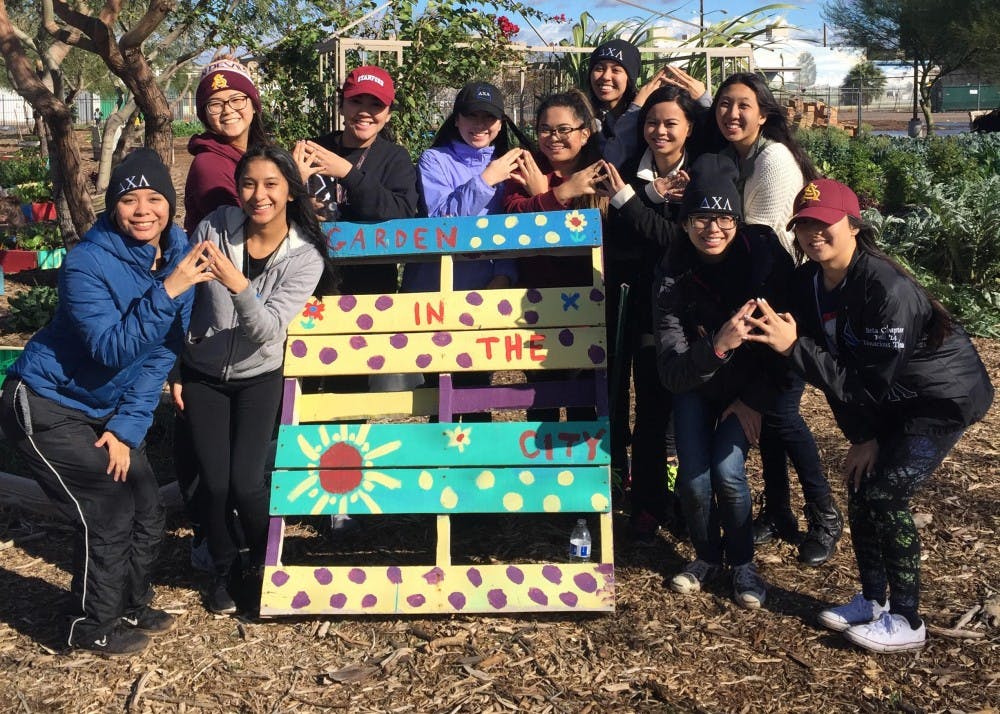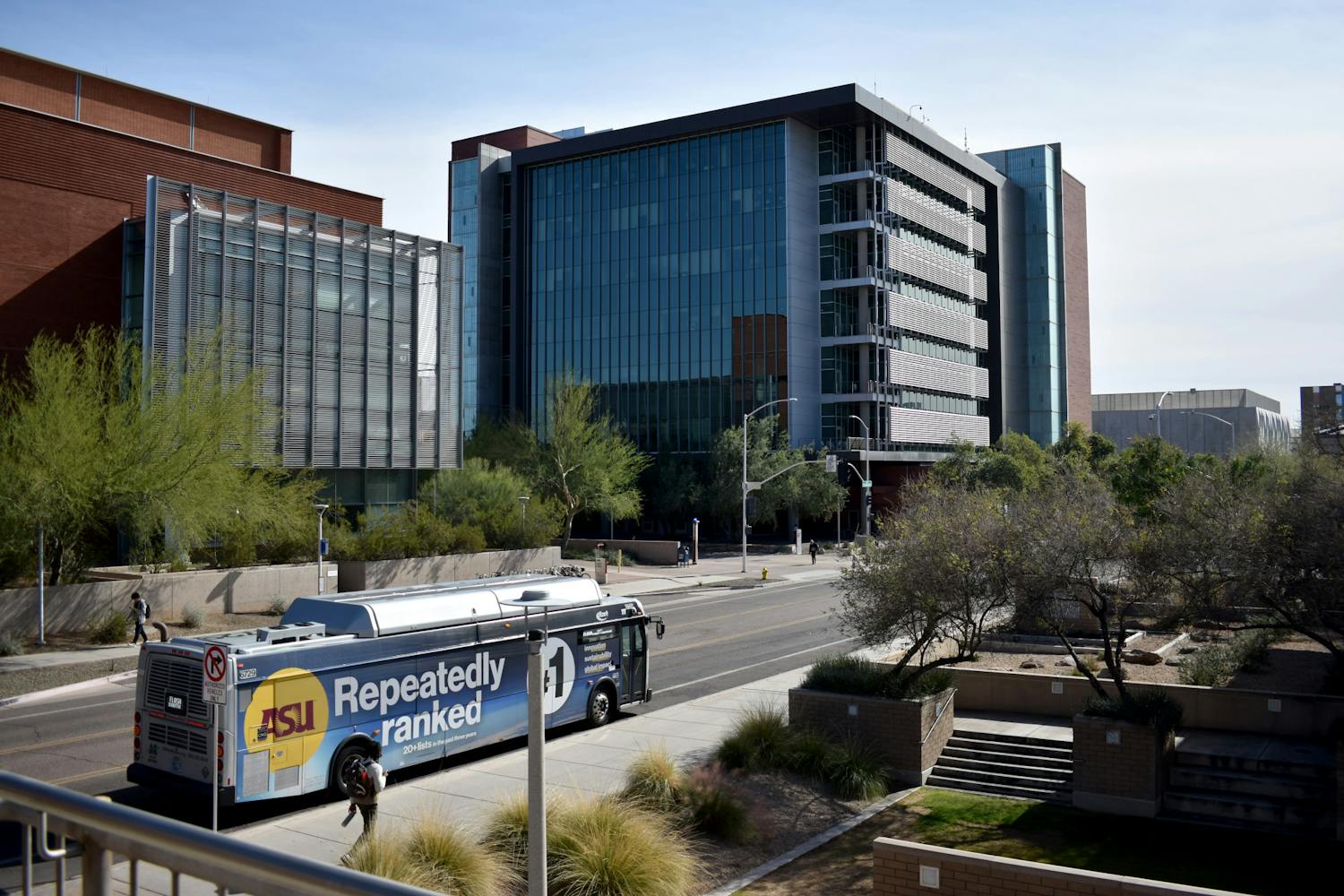Despite having a significant presence on campus, some organizations under the Multicultural Greek Council struggle to recruit new members.
ASU is home to many multicultural fraternities and sororities. There are 12 chapters affiliated with the Multicultural Greek Council. The council seeks to include all students from all walks of life and all ethnic backgrounds. However, many students are unaware of the existence of these multicultural organizations in Greek life, according to members of different multicultural Greek organizations.
Xena Baza, president of Delta Chi Lambda, one of the sororities the council represents, said that being the only Asian American sorority has proven difficult when it comes to recruitment.
“We are ASU’s only Asian-interest sorority,” Baza said. “Cultural organizations are very similar to the Panhellenic organization, but we are very different.”
The Panhellenic Council is one of ASU’s largest Greek councils.
Baza, a junior majoring in Asian-Pacific American Studies and liberal arts and sciences, said
“I think that if more people see what we are like then we would have larger numbers,” she said. “In recent years we’ve seen multicultural Greek organizations struggle with getting numbers.”
She said multicultural sororities have forced more on cultural ties as well as service than the average sorority.
“We have cultural ties in our values, but we do a lot of the same things like philanthropy, fundraising, sisterhood and community service.”
Baza said the multicultural Greek council is much smaller than other Greek committees.
“Because we’re smaller and we’re not part of the mainstream councils, like the Panhellenic Association or Interfraternity Council, we don’t have a lot of representation, so a lot of people don’t know that we exist,” she said. “Our biggest mission is having other people know we are here.”
Jennifer Hightower, the vice president for student services at ASU, provides the organizations with support. Hightower said she's focusing on encouraging growth for the multicultural organizations.
“I think that where our focus has been, is in ensuring that we can grow individual organizations as well as the broader council,” Hightower said. “In the last several years, what I have seen is more significant growth in the council and the chapters that are affiliated with the council.”
Hightower said that some chapters in the Multicultural Greek Council have struggled with their membership numbers.
“The average chapter size and the experience in the average chapter vary from chapter to chapter,” she said. “We do know that some have not been able to achieve the membership numbers that they want, but others have.”
Hightower said she believes the multicultural organizations at ASU have the potential for growth.
“I think that all of these organizations have a tremendous capacity to grow based on the diversity, size and the scope of Arizona State University,” Hightower said. “Our goal would be that we can support all of these chapters and these three councils as they continue to develop and grow over time.”
“These organizations, much like our Interfraternity Council and Panhellenic sororities, are very focused on a specific mission, and that has to do with connecting students to one another around the ideas of leadership development, philanthropy, community, and scholarships.”
Hightower said that in her role as vice president she wants to help promote multicultural groups.
“We want to do whatever we can to continue to promote the multicultural groups,” she said. “So they can meet the needs of the students who find that to be a really important part of their undergraduate experience.”
Exercise and wellness senior Adrian Ramos, president of the Multicultural Greek Council and member of the Tau Psi Omega fraternity, said that while recruitment is still a problem, things have gotten better in recent years.
“I wouldn't say there's as much of a problem now as or was before," Ramos said. "I joined in the Fall of 2014 and back then, there was a little bit of an issue with some organizations dwindling out. There are few organizations that have since become dormant because they have no members, but I think in the past year to year and a half to two years, there's been a lot of growth with multicultural organizations.”
Ramos said he feels that multicultural Greek organizations don’t get as much recognition as other Greek organizations.
“I feel we don't necessarily get as much recognition as we would like in terms of reference to the other larger councils, the Panhellenic and IFC," He said. "They are obviously the two largest councils here, but we definitely are on the rise within cultural Greeks."
Ramos said that it can be difficult for multicultural organizations when they are small.
“It's sometimes really hard with the numbers that we have. We have 15 to 20 members and organization compared to 100, there's a lot less that we can do and sometimes it can be an issue with funding.”
Monica Burford, an ASU sophomore studying psychology and a member of Delta Chi Lambda, said it has been a challenge to get the word out about her sorority.
“It’s really hard to get noticed and it’s really hard for us to reach out and find people who would be interested in join our group of girls,” she said. “We have values that are important and unique to us. Our sorority is an Asian interest sorority, so we do promote Asian awareness as well as other multicultural groups.”
Burford said if they get noticed more or get more recognition, it would help other students see how greek life really is.
“It would help students with that image of a bad stereotype of Greek life on campus,” she said. “I think the biggest struggle is being noticed and the lack of resource and recognition from the campus, I think if ASU put more emphasis and let students know that we are here for the multicultural students.”
Burford said that sororities like hers were there to help students who want to fit in.
“We’re here for the people who want to be a part of something bigger,” she said.
Reach
Like The State Press on Facebook and follow @statepress on Twitter.




